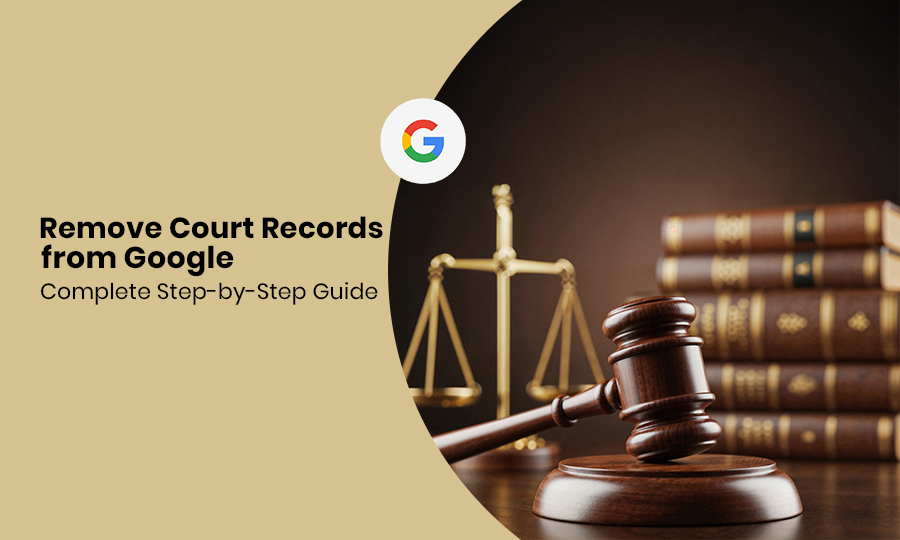Imagine this: You’ve completely transformed your life. You’ve worked hard, stayed out of trouble, and built a successful career. Then one day, you Google your name before a job interview or a first date. You find the court record from years ago, now on page one of the search results, which illustrates a story you left behind long ago. Now you’re wondering how to remove court records from Google so your present isn’t overshadowed by your past.
It is infuriating. It is unfair. And it is all too common.
Here’s something most people don’t realize: in 2022, Google approved 56% of “right to be forgotten” requests related to court records in the UK and EU. Thousands of people successfully took control of their digital reputation by learning how to remove court records from Google. The question is, can you?
Here is the truth: having old court records show up on Google may eliminate job opportunities, harm relationships, and keep you in a past you have already left. Minor criminal cases, civil disputes, or even dismissed charges have created a digital “shadow” that follows you wherever you go.
But the good news is that you are not powerless. It is possible to remove court records.
In this detailed blog, we will explain exactly how to remove them, from legal options to the process of removing them from Google to management strategies for your reputation that actually work.
Now, let’s dive into what you really need to know.
What Are Court Records and Why Do They Appear on Google Search?
First, let’s clarify what we’re dealing with when you want to remove court records from Google. Court records are official documents filed in connection with legal proceedings. These can include:
- Criminal matters (arrests, convictions, or dismissed charges)
- Civil matters (lawsuits or small claims disputes)
- Family court (divorce proceedings or custody battles)
- Bankruptcy filings
Here’s where it gets complicated: most court records are public information. This means anyone can access them, including Google’s web crawlers.
Many state and local courts publish this information on their own court websites. Legal databases like Justia, UniCourt, or CourtListener collect court case information from across the country. Some news organizations even report on court cases. Background check companies create search engines that scrape this data from public court records and sell it.
You may find your name linked to a court case across dozens of websites, all appearing in search results and leading to more reports of the case from various sources.
Important distinction: When you remove court records from Google search results, it doesn’t remove the record from the original court database. Think of Google as a massive library catalog. When you remove court records from Google, you’re removing them from the catalog, but the actual book may still exist in the library’s archives.
Key Legal Terms You Need to Know to Remove Court Records
Before you start the process to remove court records from Google, it’s important to understand a few key legal terms that explain what can be removed and under what circumstances.
- Expungement
Expungement means you remove a record as though it had never existed; this is the gold standard. Once a record is expunged, it is either legally destroyed or it is sealed so tightly you can usually deny it ever happened (except for certain situations, such as when applying for a certain type of government job).
- Sealing
Sealing is slightly different. A record might still exist, but it’s locked away from the public’s access. The public cannot see the record, but the courts and certain government agencies may still be able to view it.
- Right to be Forgotten
The Right to be Forgotten is a regulation in Europe (GDPR) that enables individuals to request search engines to remove specific search results about them. It is not as easy in the United States, but a number of states are beginning to introduce similar protections.
Understanding these distinctions is critical because your approach to remove court records from Google depends on which legal remedy is available to you.
Why You Need to Remove Court Records from Google
Your online reputation isn’t about vanity; it’s about opportunity. When an employer, landlord, romantic partner, or business associate searches your name, their first impression is shaped by what appears in those results. Fair or not, this is reality.
When court records dominate Google results, here’s what’s at stake:
- Professional Opportunities Diminish
Research shows that up to 70% of employers use Google searches when screening candidates. An old court record can eliminate you from consideration before you ever get to tell your side of the story.
- Housing Becomes More Difficult
Landlords perform background checks, which might include Googling the prospective tenant. Court records for evictions or for any criminal case, or even for contentious divorces, can cost you the apartment you want.
- Relationships Suffer
Whether dating or simply meeting friends, people have a natural inclination to search for others online. An old courthouse case has the potential to make the conversation awkward before you’ve even had a chance to establish some trust.
- Limited Financial Opportunities
Some lenders, insurers, and financial institutions consider your digital footprint when assessing applicants. Court records indicating financial distress or legal issues can put a barrier against anything from loans to rates on insurance.
- Harassment and Stigma Persist
Unfortunately, some people will use others’ online records to shame, harass, or discriminate against them. The accessibility of such records makes you subject to unwanted attention.
- Identity Theft Risk Increases
Court documents generally contain personal information such as addresses, birthdates, and names of family members. The more exposure this information gets online, the more risk you face for identity theft.
Beyond these practical concerns, there’s the fundamental issue of peace of mind. When your past is on display 24/7, you can’t move forward without constantly looking back. Learning how to remove court records from Google is essential for controlling your own narrative.
Step-by-Step Process to Remove Court Records from Google
Think of this process as a pyramid. We build the strongest, most permanent solutions at the base, then layer additional strategies to manage what can’t be completely removed. Here’s our strategic approach to removing court records from Google search results.
Step 1: Determine If You Can Expunge or Seal the Record

This is your first step because removal at the source provides the strongest, most permanent solution. If expungement is possible, it should be your top priority when you want to remove court records.
States have vastly different laws regarding criminal record expungement. Some states are generous, allowing expungement for:
- Arrests without convictions
- Minor offenses
- Completion of diversion programs
Other states have significant restrictions and only permit expungement in extremely limited circumstances.
Your Action Plan:
- Research your state’s expungement laws: Most state court websites provide eligibility information. Look for terms like “expungement,” “record sealing,” “set aside,” or “certificate of rehabilitation.”
- Consult with a criminal defense attorney: We understand legal fees can be substantial, but many attorneys offer free consultations or sliding-scale fees. Consider this an investment—an experienced attorney understands the nuances of the legal process and significantly increases your chances of success.
- Gather your documentation. You’ll need:
- Certified copies of your court records
- Proof of sentence or program completion
- Character references or evidence of rehabilitation
- File the petition. This typically involves:
- Filing forms with the court where your case was handled
- Paying filing fees (usually $100-$500)
- Potentially attending a hearing
- Obtain the official order. Once approved, you’ll receive a court order stating your record has been expunged or sealed. This document is invaluable for the next steps.
With an official expungement or sealing order, you have legal leverage. You can compel databases to remove court records, and Google is far more likely to honor your removal request. Without it, you’re essentially making requests without legal backing.
Step 2: Request Removal from the Source Website

Once you’ve addressed the legal aspect (or determined it’s not an option), it’s time to tackle third-party websites hosting your court records.
This is tedious work, I won’t lie. But it’s necessary.
- Identify All Websites
You need to identify which websites profiled you because of any record. Google your name plus terms like “court records,” “arrest,” “criminal record,” “lawsuit,” etc. Then make a spreadsheet with every single URL where your information is shown. This will include official government court websites, legal databases, news articles, and background check websites.
- Prioritize by Impact
Some sites are worse than others. An article from a major news source or a bigger legal database will have more impact than some random tiny aggregation website. As with anything, work on the biggest problems first.
- Submit Formal Removal Requests
Most credible websites have a process for removal:
- Government court websites: If you actually have an expungement or sealing order, send a copy and a formal letter requesting removal. Make sure to include the case number in the letter and your contact information. A lot of courts have to remove expunged records from their public portals by law.
- Legal databases: These websites have a privacy request form. You’ll also have to provide proof of expungement, or legal removal. In either case, be prepared on the phone or in the form to justify why that information should now be taken down.
- News websites: This is more challenging. Newspapers and news sites have First Amendment protections they’re not required to remove accurate reporting of public events. However, some publications may:
• Publish an update
• Remove your name from searchable text
• Unpublish articles if charges were dismissed or you were acquitted
• Contact the editor, newsroom, or respond to the article directly with your documentation and request.
- Background check and data aggregation websites: There are sites like BeenVerified, Spokeo, and Whitepages, where you submit an opt-out process. You need to locate each website, find its specific opt-out form, fill it out and submit your information, and then follow up individually to ensure that every website has taken down all information about you as requested.
- Document Everything
Keep every email you sent and received confirmation for. Keep a copy of every website that has agreed to remove your information. You will need this paper trail if you have to escalate the situation.
- Follow Up Persistently
Do not assume that just one email was sufficient. Follow up a week later and then two weeks later. If necessary, escalate to their supervisors or legal departments. Be polite, but firm.
Let me put this in more realistic terms: not every website will comply. Some websites will not respond at all. Some websites will respond and refuse to do anything. Some websites will remove your information, but it will reemerge in their systems the next time they update their database. This happens, and that is alright; we are in this for the long term.
Step 3: Submit a Legal Removal Request to Google

This is the big one for getting Google to stop showing the court record you have searched in their search results for your name. Google gets millions of removal requests every year, and they have a simple system in place for dealing with them.
- Navigate to the Google Legal Help Center
You can find it at support.google.com/legal, then locate “Remove content from Google.” You want the option that says something similar to “Remove content for legal reasons” or “Remove information from Google.”
- Choose the Appropriate Category
Google offers different forms for different removal request types. When you want to remove court records from Google, you’ll typically select:
- “Outdated or legally restricted content”
- “Personal information that may contribute to identity theft”
If you have an expungement order, that’s your strongest basis for removal. Select the legal removal option.
- Complete the Form Thoroughly
Fill out the entire form so Google understands you are an individual without malicious intent:
- The specific URLs where this content appears
- Your contact and personal information
- The specific content you would like removed
- Your reasoning for removal
- Upload Supporting Documentation
This is one of the most critical steps. Submit:
- Your court order showing the record was expunged or sealed
- Official documentation from source websites showing they removed the information
- Official government documentation proving the record no longer exists publicly
- Any other relevant legal documentation
- Submit and Monitor
Submit the request and check back. Google will review your request once you submit. This could be anywhere from a few days to several weeks. You will be able to check your request status simply by logging into your Google account, and/or they will email updates. So check the status regularly.
- Prepare for a Second Submission
If Google denies your request, don’t lose hope. Make sure to read their explanation thoroughly, respond to their explanation, and submit the request again with additional documentation or explanations. In many instances, you will have to submit multiple times.
Now here’s the good news: if you have a legitimate expungement order and can prove that the information is legally restricted, Google is actually quite reasonable about compliance when you request to remove court records from Google. The company has a good track record of complying with valid court requests.
Now here’s the bad news: if you’re simply asking Google to remove court records that are accurate, public information without a legal basis, they will generally deny your request. When the court records remain legitimate public records (not expunged or sealed), Google will almost always refuse removal.
Step 4: Reputation Management & SEO Suppression

Even after following every step correctly, some court records may continue appearing on Google. This happens when:
- Expungement wasn’t legally possible
- Source websites refused removal
- Google denied some removal requests
In these situations, we shift from a removal strategy to a suppression strategy. The goal is to push negative results below the first page of Google search results, where they become effectively invisible.
Consider your own search behavior. When was the last time you went to page two or three of Google results? Exactly. If we can push court records beyond page one, we’ve solved 95% of the problem.
Create Positive, Prominent Online Content
You need to flood Google with better information about you. This means:
Professional Profiles
- Develop comprehensive LinkedIn profiles showcasing your expertise and achievements
- Create profiles on industry-specific platforms
- Build a personal website highlighting your professional accomplishments
Strategic Social Media Presence
- Maintain professional accounts on platforms like Twitter/X, Instagram, or YouTube
- Post regularly but strategically—quality matters more than quantity
- Focus on content that reflects your professional identity
Content Creation
- Start a professional blog
- Write guest posts for industry publications
- Participate in podcast interviews
- Publish articles on Medium, LinkedIn, or industry sites
Press Releases
- Announce professional achievements, awards, or new positions
- Use services like PR Newswire or PRWeb to leverage news aggregators
- These provide significant SEO benefits and create positive, highly-ranked content
Implement SEO Best Practices
You don’t need to become an SEO expert, but strategic optimization helps:
- Use your full name consistently across all platforms
- Build backlinks by having colleagues, friends, or industry contacts link to your positive content
- Incorporate relevant keywords describing your work and expertise
- Ensure all profiles are complete with photos and regular updates
Consider Professional ORM Services
In some cases, working with Online Reputation Management (ORM) professionals can be helpful, especially when trying to address sensitive or outdated information like court records that appear in search results. These services typically involve creating and optimizing multiple online profiles, improving search visibility through SEO techniques, and consistently monitoring rankings to track progress.
It’s important to understand that reputation management is not an immediate process. Noticeable changes often take several months of steady, strategic effort. Over time, this can shift older or less relevant information further down in search results, allowing more current and balanced content to appear first.
The objective of ORM isn’t to erase the past but to provide a fuller, more accurate reflection of your professional or personal identity online—one that includes your achievements, work, and growth alongside previous records.
What to Do If Google or Source Removal Fails
Let’s address what happens when your initial efforts to remove court records from Google don’t go as planned.
You submitted your removal request to Google, and they denied it. Or the source website rejected your request to remove court records. Or worse—the website removed the record, then republished it later. What now?
Our team encounters these scenarios regularly. Here’s your strategic response:
- Understand Why It Was Denied
Google or the source website may provide context or reasoning. Common reasons include:
- Insufficient supporting documentation
- The record remains public without documentation of legal sealing
- Improper identification of content to be removed
- The website has a valid legal interest in maintaining the information
- Strengthen Your Documentation and Resubmit
If you can address the issues raised and obtain stronger evidence, resubmission often succeeds. Sometimes it’s as simple as providing a clearer copy of your expungement order or additional court documents proving legal sealing.
- Engage Legal Representation
If self-help attempts to remove court records aren’t working, it may be time to involve an attorney. Legal representation can:
- Send cease and desist letters that websites take more seriously
- File formal DMCA takedown notices when appropriate
- Pursue litigation against websites violating record sealing laws
- Navigate complex privacy laws applicable to your situation
- Leverage Privacy Advocacy Groups
Organizations like the Electronic Frontier Foundation (EFF), ACLU, or state-based privacy advocates occasionally take on cases involving online reputation and privacy rights. While they don’t accept every case, they may engage with cases having significant precedential or policy implications.
- Intensify Suppression Strategies
If you can’t completely remove court records from Google, focus on burying them. Increase your reputation management efforts:
- Create positive content more frequently
- Engage professional ORM services if you haven’t already
- Build an overwhelmingly strong positive online presence that makes court records a small footnote
- Understand the Limits
This is difficult to accept, but sometimes you cannot fully remove court records from search results. In the United States, strong First Amendment protections apply to publicly available information and journalists covering court matters. Unlike Europe’s “Right to be Forgotten,” American law heavily favors transparency and free speech over individual privacy rights—and court records exemplify that difference.
If you’re dealing with accurate reporting of a public court case or incident, and the court records haven’t been expunged or sealed, the news report likely can’t be removed from search results.
It’s not hopeless—but your energy is better invested in reputation building and content creation rather than pursuing impossible removals when you can’t legally remove court records.
- Time as a Healing Factor
Even when you can’t remove court records completely, time helps. Old content naturally drops in rankings as new content is created. Combined with reputation management, many clients find that court records fall to page two or three naturally through consistent creation of positive content.
Emerging Trends and Legal Developments for Court Records Removal
The landscape surrounding court records and online privacy is evolving rapidly. At RBS Reputation Management, we stay ahead of these developments to serve our clients better and help them remove court records from Google more effectively.
- “Right to be Forgotten” Expanding Beyond the EU
While the GDPR led the way in allowing individuals to remove court records from search engines, other jurisdictions are following suit. California’s CCPA (California Consumer Privacy Act) includes similar protections. Other states are considering legislation providing Americans with greater control over their personal information online, including court records.
- AI’s Dual Impact
- Positive: AI-driven technologies are becoming more sophisticated at monitoring online reputation and tracking court records without manual searching. New services use AI to continuously crawl the web and alert you when court records appear.
- Negative: AI technologies are also making it easier for background check companies and data aggregators to scrape, process, and republish court records at scale. It’s an escalating arms race.
- Growth of Professional ORM and Legal-Tech Services
There’s an expanding market of companies specializing exclusively in removing or suppressing court records. This includes:
- Law firms focusing on expungements
- Tech startups automating removal requests
- Full-service firms like RBS providing comprehensive reputation management
The market is responding to demand, indicating how widespread this problem has become.
- Transparency Initiatives
Projects like the Lumen Database track legal removal requests sent to Google and other search engines, creating a public record of what’s being removed and why. This provides a balance between privacy and transparency. Check Lumen to see if similar cases to yours have been successfully removed.
- The Ongoing Debate
There’s legitimate tension between two important values: public access to court records (promoting government transparency and accountability) versus individual privacy and the right to move past mistakes. Courts, legislators, and advocates are all grappling with where the appropriate balance lies.
Some states are liberalizing expungement laws, recognizing that a permanent digital scarlet letter serves little public purpose for minor offenses or very old cases. Other jurisdictions push back, arguing that public access to court documents is necessary for safety and transparency.
- Monitor Legal Changes
If you’ve been unable to have court records removed under current law, pay attention to your state legislature. New bills regarding expungement, privacy regulation, and court record access are introduced in nearly every state each year. What seems impossible today may become routine tomorrow.
Protective Measures: Safeguarding Your Privacy Moving Forward
Now let’s shift from defense to offense. After addressing your court record issue, how do you protect yourself from future ramifications?
- Set Up Google Alerts
This is free and takes two minutes. Visit google.com/alerts and create alerts for your name (try different variations and nicknames, too). You’ll receive email notifications whenever new content mentioning your name appears online. Catching something immediately is far easier than removing it later.
- Conduct Regular Online Audits
Every few months, search for your name on Google. Check your name combined with “court,” “lawsuit,” “arrest,” “criminal,” etc. Also search for images. Make it a habit to see what others see when they search for you.
- Proactively Opt Out of Data Brokers
Don’t wait until your information appears on background check sites—take the offensive. Dozens of data broker sites exist: BeenVerified, Spokeo, Whitepages, Intelius, PeopleFinders, and many more. Each has its own opt-out process (intentionally tedious), but it works. You may need to repeat this annually or quarterly.
Pro tip: Services like DeleteMe or Privacy Bee handle opt-outs for you for a fee ($100-$200/year). If you value your time, it’s worthwhile. Many also offer image opt-out services.
- Review Privacy Settings Regularly
Check your social media privacy settings periodically. Limit how much the public can see—posts, photos, and personal information. Be mindful of what you make public. Anything public can be indexed by search engines.
- Build and Maintain a Positive Online Presence
The best defense is a good offense:
- Regularly update professional profiles
- Post occasionally about your work, accomplishments, or industry insights
- Maintain presence in professional communities
The more positive content ranks well, the harder it is for negative content to rank above it.
Our real-time monitoring system tracks developments across all platforms, ensuring swift responses to new issues before they escalate. This proactive approach is key to maintaining your hard-won reputation gains.
- Use Reputation Monitoring Tools
Beyond Google Alerts, services like Brand24, Mention, or BrandYourself offer more sophisticated monitoring. They track not just mentions of your name but also related terms and context that could affect your reputation.
- Think Before You Litigate
This may be uncomfortable, but it’s important: Every time you sue someone, get sued, file for bankruptcy, or go through an ugly divorce, you’re creating public court records. Sometimes legal action is necessary—we’re not suggesting you forgo justice—but if alternative dispute resolution methods exist (mediation, arbitration, settlement), consider them. Resolving disputes outside the court system avoids creating publicly accessible records.
- Practice Digital Discretion
Simple rule: Don’t post anything online you wouldn’t want as part of public court documents. Information posted on social media, forums, or blogs can be subpoenaed as evidence, becoming part of public court records. Exercise digital discretion.
- Know Your Rights
Educate yourself on your state’s privacy laws. Understand what information can be included in public records and when records can be expunged. The more informed you are, the better you can protect yourself proactively rather than reactively.
Your Next Steps: Taking Control of Your Digital Narrative
Court records can damage your reputation, close opportunities, and keep you tethered to mistakes you’ve long since moved beyond. But you have options. Legal expungement, source removal, Google removal requests, and strategic reputation management are all tools available to you.
The process isn’t instant. It takes time, may cost money, and you might encounter setbacks. But taking control and actively working to change the narrative surrounding your past is far better than doing nothing and allowing old court records to continue defining you.
We hope that our comprehensive guide will help you know the most effective ways through which you can remove your court records from the platform, or at least redact your name from the court records. However, the process often ensures success with professional assistance. You can seek relevant services from a reputable online reputation agency to ensure the success of the court record removal process.

